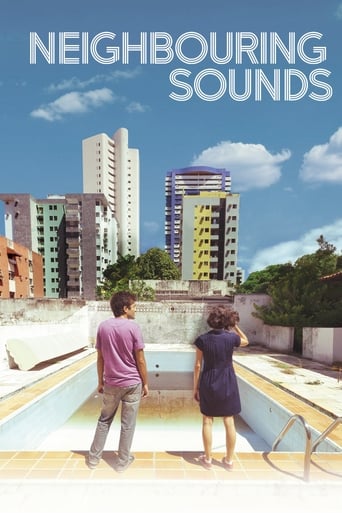tieman64
"How can you measure progress if you don't know what it costs and who has paid for it? How can the 'market' put a price on things - food, clothes, electricity, running water - when it doesn't take into account the 'real' cost of production?" ― Arundhati Roy Directed by Kleber Mendonca Filho, "Neighbouring Sounds" paints a portrait of the director's own hometown. Part Robert Altman ("Kansas City"), part John Sayles ("Sunshine State"), the film is set in the streets of Setubal, a town in one of Brazil's largest cities.Mendonca's title may allude to the sounds of urban life, but what he's primarily interested in is the sound of locking doors. Throughout the film, we're constantly reminded of the threat of crime, the fear of intrusion and the possibility of violence. This violence is the film's chief interest, though Mendonca goes to lengths to disguise this fact. Instead, we watch as a series of characters navigate a concrete labyrinth adorned with protective bars, metal grilles, security alarms and cordoned off spaces. We watch as immigrants are hired to tutor children, favela kids are bullied, gangs offer to protect buildings, upper-class women marinade in ennui and various characters reveal insecurities, paranoias and their desire to climb the social ladder. Paradoxically, everyone knows their place, each character deferential to invisibly drawn social lines.It's only during the film's climax in which the ten black-and-white photos which open the picture (of fenced off countrysides, happy workers, angry villagers, palatial villas etc) are explained. Here Francisco Oliveira, a patriarch who got rich selling sugar and who now owns most buildings in Setubal, is implicated in the town's bloody history, a history which leaks into the present and mutates into modern forms of literal and psychic violence. Class divisions and lines of demarcation forged Oliveira's wealth, gave birth to Setubal, and now, in the present, separate neighbour from neighbour, brother from brother. Setubal may seem peaceful, but the ramifications of land-grabs, slavery and class warfare are everywhere.Unsurpsiingly, Mendonca is also preoccupied with issues of race. The condos and upper-middle class apartments of Setubal are populated by pale, white skinned men and women, whilst the housemaids, valets, janitors and street urchins are all various shades of brown or black. The classes put on happy faces, but key each other's cars and engage in other covert or overt forms of disrespect. Of course capitalism has always pitted the middle against the lower class, the lower against the middle and both against foreigners. But in Setubal, iron bars seem to keep everyone firmly apart. They're all jailed, eyeballing one another through cages. Only rarely does contact and so conflict arise. And when it does, blood spills.8/10 – Worth one viewing. See "Cutter's Way".
Red-125
The Brazilian film O som ao redor was shown in the U.S. with the title Neighbouring Sounds (2012). It was directed by Kleber Mendonça Filho.The setting for this movie is modern day Recife, Brazil. (Recife is a seaport at the easternmost tip of Brazil.) A better title for the movie would be "Neighborhood Sounds," because the sounds in this affluent neighborhood are intimately involved with the plot.This is not a violent film. It doesn't take place in a favela, but rather in an affluent neighborhood. Still, violence is always lurking in the neighborhood, just off-screen. Every home has a security system, but any car parked in the street is fair game for thieves.A security firm comes to the neighborhood, and most of the residents ante up the money to purchase their services. The security men appear honest and capable enough, and hiring them probably made sense. They become part of the neighborhood scene.Meanwhile, life goes on around them. There's a dog that howls and barks all night, a woman who uses her vacuum to suck marijuana smoke out of her apartment, a pair of lovers, a deliveryman who delivers water and other substances on demand, and the locally influential man who walks past the "caution--sharks" sign to go swimming.Matters come together in the end in a way I would never have predicted. I'm not going to spoil the ending by even hinting at it. However, it made sense once I thought about it.We saw the film at the newly refurbished, excellent Dryden Theatre at Eastman House in Rochester, NY. However, it will work very well on DVD.
Alex_br
The film reminded me of "The Class" (France 2008). Just change the school by a handful of houses in the same street. The relationships among the characters are unveiled as the story goes, there is nothing special about any of them, there is nothing special going on in theirs lives. It looks like a very casual portrait of any given month in Recife.People made a lot of fuss about the private security guys that show up, about the claustrophobic feeling, about the master/servant relation depicted all the time, but in fact, it is not big deal. It is no news. It is simply how life is down here.For a foreigner it may look strange, odd, annoying, maybe violent, but down here it is our daily life. That's how things are. In that sense the film is dull. Didn't bring us anything new, didn't show anything we are not used to see daily around us.
Howard Schumann
Sounds punctuate the neighborhood in Kleber Filho's exhilarating Neighboring Sounds: a dog barks incessantly, street vendors blast their stereos, the noise of TVs reverberate through the streets, a vacuum cleaner rumbles, a washing machine vibrates, and a car sideswipes another. Neighboring Sounds employs a wealth of cinematography and sound to chronicle the anxiety that permeates a middle-class street in Recife, Brazil's fifth largest city. Winner of the FIPRECI Prize at the Rotterdam Film Festival and four major awards at the Gramado Film Festival in Brazil, the film appears to be a typical crime drama but becomes a mix of the existential ennui of Antonioni and the paranoia of David Lynch.Antonioni's own characterization of his 1960 masterpiece, L'Avventura, is a good fit for Filho's first feature, "Nothing," he said," appears as it should in a world where nothing is certain. The only thing certain is the existence of a secret violence that makes everything uncertain." Unlike many Brazilian films, this is not about favelas or drugs, but about the uneasy divide between a growing middle-class and their help living side-by-side in a crowded urban setting. Scenes are framed behind fences and grated doors to suggest maximum isolation, a suggestion that in today's Brazilian urban areas, a melting pot is built out of necessity, not of choice.The film opens with a montage of black and white photos of workers in a sugarcane plantation peering into the camera with tools raised, and sweat accumulating on their faces from slaving in the fields in the heat of the day. The weary faces suddenly melt into the shot of a young girl on rollerblades in a parking lot surrounded by tall white-walled condos. Like Lucretia Martel's La Cienaga, Neighboring Sounds unfolds in a series of small incidents that convey an atmosphere of encroaching claustrophobia. Pointing to the local power structures that rule the streets, the block is run by the local "don," Francisco (W. J. Solha), a wealthy landlord with a questionable past. João (Gustavo Jahn), Francisco's grandson, is a real estate agent for the family who has established a promising relationship with Sofia (Irma Brown).Accumulated incidents shape the film's message. João and Sofia are caught naked in their living room by the arriving housemaid Maria (Mauricéa Conceicão) who makes light of the incident, engaging in conversation with João and Sofia in the confining space of his kitchen. Bia (Maeve Jinkins), another nearby resident trying to raise two small children, is consumed by managing her domestic help, organizing English and Mandarin lessons for her young children, while drugging the neighbor's dog, amusing herself by smoking pot delivered to her by a drug-dealing water delivery man, and masturbating to the whir of the washing machine. Meanwhile, Sofia tells João that her CD player has been stolen from her car and asks for help to get it returned.João immediately suspects his cousin Dinho (Yuri Holanda), a layabout who is used to getting what he wants and reacts aggressively when confronted. Sparked by the car theft and other recent incidents on the block, João hires a security patrol manned by Clodoaldo (Irandhir Santos) to oversee the neighborhood's safety. Though the residents of the block are relatively well off, they need more and more security but even then, do not feel safe in a country where there is a large disparity between rich and poor. The security patrol is ostensibly there to ensure the neighbor's safety, but accomplishes the very opposite when their true motives are revealed. As the accumulation of tension explodes in an illuminating burst of sound, the world ends not with a whimper but with a bang.


 AD
AD



